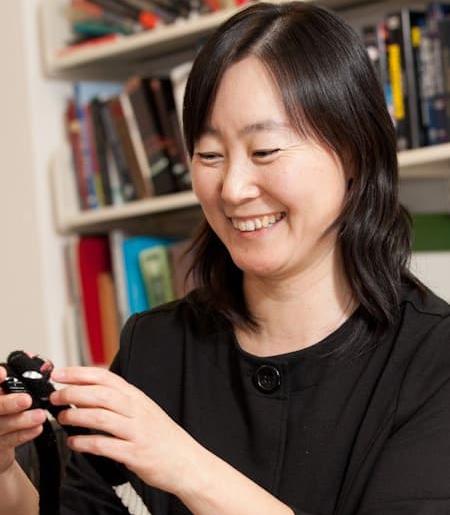Overview
Molecular Mechanics of Fundamental Biological Processes
Fundamental biological processes require the concurrent occupation of DNA by numerous motor proteins and complexes. Thus, collisions, congestion, and roadblocks are inescapable on these busy ‘molecular highways’. The consequences of these traffic problems are diverse, requiring complex molecular mechanisms to resolve threats to genome stability and ensure cellular viability. Additionally, the molecular highways are continually and dynamically restructured during these processes, altering highway topology and traffic flow.
My laboratory focuses on the motion, dynamics and mechanics of DNA roadblocks, how DNA motor proteins collide and navigate through roadblocks, and DNA topology during transcription and replication. These highly complex problems require the development of real‐time techniques to decipher the actions of multiple players, while also simultaneously allowing the ability to mechanically control, alter, and measure DNA topology. To work with biological motors and DNA at the single molecule level, we develop and utilize state-of-the-art (and often one-of-a-kind) instruments spanning optical trapping, magnetic tweezers, and nanophotonics. These allow us to directly measure molecular extensions, forces, and torques on the scales of nanometers, piconewtons, and piconewton×nanometers. We also combine our novel measurements with statistical mechanical models to better elucidate the mechanisms of these molecular machines.
Our precision measurements and models have enabled novel insights into the complex coordination of cellular machineries and the fundamental role of DNA mechanics and topology – including measurements of RNA polymerase torque generation capacity, mechanistic insights into lesion bypass during replication and subsequent re-initiation, and the intricate coordination mechanisms between RNA polymerase and the replisome or motor proteins.
Graduate Students
Jin Qian
Awards and Honors
- Damon Runyon Scholar Award, 1999-2000
- Dale F. and Betty Ann Frey Scholar of Damon Runyon-Walter Winchell Foundation, 1999
- Alfred P. Sloan Research Fellow, 1999-2001
- Beckman Young Investigator Award, 1999-2002
- Keck Foundation Distinguished Young Scholar in Medical Research Award, 2000-2007
- Howard Hughes Medical Institute Investigator, 2008-present
- Provost's Award for Distinguished Scholarship, 2008
- Fellow of the American Physical Society, 2009
- Member of the National Academy of Sciences, 2023
Professional Experience
- 1994-1997 Postdoctoral Fellow in Biophysics, Princeton University.
- 1998-2004, Assistant Professor of Physics, Cornell University.
- 2004-2009, Associate Professor of Physics, Cornell University.
- 2009-present, Professor of Physics, Cornell University.
- 2019-present, J.G. White Distinguished Professor in the Physical Sciences, Cornell University
Publications
T.T. Le, X. Gao, S. Park, J. Lee, J. T. Inman, J.H. Lee, J.L. Killian, R.P. Badman, J.M. Berger, and M.D. Wang. “Synergistic Coordination of Chromatin Torsional Mechanics and Topoisomerase Activity.” Cell 179: 619–631 (2019).
T.T. Le, Y. Yang, C. Tan, M.M. Suhanovsky, R.M. Fulbright, Jr., J.T. Inman, M. Li, J. Lee, S. Perelman, J.W. Roberts, A.M. Deaconescu, and M.D. Wang. “Mfd dynamically regulates transcription via a release and catch-up mechanism.” Cell 172, 344-357 e315 (2018).
M. Soltani, J. Lin, R.A. Forties, J.T. Inman, S.N. Saraf, R.M. Fulbright, M. Lipson, and M.D. Wang. “Nanophotonic trapping for precise manipulation of biomolecular Arrays.” Nature Nanotechnology 9:448-52 (2014).
J. Ma, L. Bai, and M.D. Wang. “Transcription under torsion.” Science 340:1580-3 (2013).
B. Sun, D.S. Johnson, G. Patel, B.Y. Smith, M. Pandey, S.S. Patel, and M.D. Wang. “ATP-induced helicase slippage reveals highly coordinated subunits.” Nature 478:132 -5 (2011).
D.S. Johnson, L. Bai, B.Y. Smith, S.S. Patel, and M.D. Wang. “Single molecule studies reveal dynamics of DNA unwinding by the ring-shaped T7 helicase.” Cell 129:1299-309 (2007).
C. Deufel, S. Forth, C.R. Simmons, S. Dejgosha, and M.D. Wang. “Nanofabricated quartz cylinders for angular optical trapping: torque detection during DNA supercoiling.” Nature Methods 4:223-5 (2007).
In the news
- Unexpected allies: DNA packaging aids gene expression
- Physicist Michelle Wang named Biophysical Society Fellow
- Physics professor elected to National Academy of Sciences
- Tweezers untangle chemotherapeutic’s impact on DNA
- CRISPR insight: How to fine-tune the Cas protein’s grip on DNA
- ‘Lab on a chip’ can measure protein-DNA interactions
- Forces That Drive the DNA Highway
- New technique illuminates DNA helix
- Nobel-winning physicist Arthur Ashkin, Ph.D. ’52, dies at 98
- 30 Arts & Sciences faculty honored with endowed professorships
- Scientists unwind mystery behind DNA replication
- Newly developed techniques shed light on key protein’s regulatory ability

